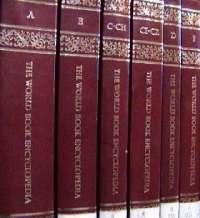Reading everything
When I was a kid, we had the twenty-odd volumes of The World Book Encyclopedia sitting in its own rack in our upstairs hallway. It was a lively encyclopedia, with pages of colorful flags from around the world and a supplement that one year used acetate overlays with the enthusiasm of a Hollywood director who’s discovered a left-over special effects budget.

I was not the nerd who in 6th grade let it slip that he was reading the entire set, although I was envious of him. Fortunately, my attention was soon taken up by the serious pursuit of masturbation. Still, no matter which path one took, it made a difference that it was theoretically possible to read everything worth knowing.
So, what do kids do now? Is there any known landscape of knowledge that an insecure, overly-intellectual, never-gets-picked 6th grader can traverse? Or is he left simply to googlebate?










“Reading Everything”
While humorous, it is a good point and decent question. I would say a decent answer would be to turn somewhere like Wikipedia.
Great post I must say. As I say in my blog I think a decent place on the net to go for this kind of thing is Wikipedia. There are some excellent articles there, and some completley random ones that make for some interesting reading.
Definitely WikiPedia where such kids (and adults) not only read, they write and edit.
I think that having and reading The World Book Encyclopedia was, for me, a different experience than Wikiing, and certainly different than _______-bating.[explanation below]
My memories (similar to David’s with regard to both the World Book and masturbating) are tactile. I remember the binding (mine was bas relief white) and the sequence of my favorite volumes on the shelf.
The most important formative impression, though, was of an authoritative source among a relatively limited set of sources. If an unknown country, concept, name came up, it was probably in the World Book (Brittanica, Collier’s… name your favorite from cica 65-75). It was often very likely to be a super-set of my public education and the television shows I watched. Even most of the books I read when I was 10 or 12 were ‘contained’ by the World Book. (I didn’t get to monism or res judicata till later).
I frankly don’t know whether my college age son or middle school daughter HAS an analogue to World Book. Authority is not contained in one place for them. For that matter, I’m not sure authority, for them, is ‘contained’ anywhere or in any place.
Come to think of it, in my old age, I’m beginning to think in the same way. Certainly, authority (as in: trusted with questions of truth) is not contained in Washington these days.
r
(explanation: David’s spam filter doesn’t like the name of that illustrious search engine in the text.
I used to like the anatomy overlays. I remember learning there that the human body is 97% water. Go Thales! I basically memorized the astronomy section on stars and the solar system. The set seemed like a portal to another dimension, indeed.
r, I would have to say that I find that authority in the Internet. I am certainly not naive enough to say that I find it in any one site, as I don’t think any site is THAT credible. But I know that if after a 30 min search on the Internet, if I can’t find something, then more information on it would only come from serious academic research. I find the Internet authoritative because not only can I find the objective overview of somewhere like say Wikipedia, but I can get people’s personal views and opinions on mostly every aspect of that subject. The Internet almost always exposes you to some kind of public discussion about the topic, which I think can be more informative than anything else.